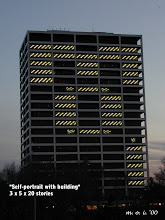
Today is the 40th anniversary of the Rev. Dr. Martin Luther King Jr's assassination. King was in Memphis that week at the bequest of black sanitation workers who were on strike at the time. Among the things they were striking for was the right to be paid the same as white sanitation workers who did the same job.
Earlier in the year King had begun to intertwine his views on race, economic justice, and the Vietnam War into a Poor People's Campaign designed to rebuild American cities with jobs, equality, and peace. And the desperate need for the nation to comfort it's shortcomings.
Forty years later we stand in some ways at similar crossroads. The nation is going broke fighting a war that sounds oddly similar to King's appraisal of the Vietnam War, for which he was excoriated in the mainstream press and vilified by racists.
Now is the time.
King was one of the greatest orators that America has ever produced, if not the greatest. His words jolted a generation to stand for change and for that King won the Nobel Peace Prize, the youngest person ever to receive the award.
I remember reading King's Letter from Birmingham Jail in high school. It was standard reading in English texts on how to write a persuasive essay.
What is rarely remembered about King's letter is that it was from one member of the clergy to other members. King was responding to a group of white clergymen who'd written a letter suggesting that although the case of racial equality was a just one, it was really a matter for the courts to decide.
Christians have waited for thousands of years, the white clergy had written, you should be happy to wait for the outcome of the courts, chiding King as being too bold for organizing civil rights protests. King said no. To wait was immoral.
Now is the time.
Now is the time to make real the promise of democracy and transform our pending national elegy into a creative psalm of brotherhood. Now is the time to lift our national policy from the quicksand of racial injustice to the solid rock of human dignity.
King argued quite forcefully and gracefully, including words of those who had informed the white clergy, the Apostle Paul, St. Thomas Aquinas, Jesus, and Martin Luther that everyone should, and must stand against injustice. Religious leaders must stand at the forefront and if they will not, others should push them aside and take the reigns. King took the clergymen to task asking:
"What kind of people worship here? Who is their God? Where were their voices when the lips of Governor Barnett dripped with words of interposition and nullification? Where were they when Governor Wallace gave a clarion call for defiance and hatred? Where were their voices of support when bruised and weary Negro men and women decided to rise from the dark dungeons of complacency to the bright hills of creative protest?"
And King voiced words that sound all too familiar today.
Every day I meet young people whose disappointment with the church has turned into outright disgust. Perhaps I have once again been too optimistic. Is organized religion too inextricably bound to the status quo to save our nation and the world? Perhaps I must turn my faith to the inner spiritual church, the church within the church, as the true ekklesia and the hope of the world.
Now is the time.
Image: Martin Luther King and Malcolm X waiting for press conference, March 26, 1963, Marion S. Trikosko, Library of Congress collection.
elsewhere:
letter from birmingham jail


No comments:
Post a Comment